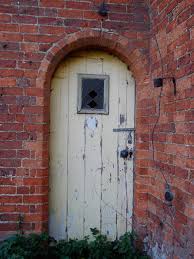We’ve never purchased those door locks that go on kitchen cabinets to keep toddlers out. Our current house came with a few in the bathroom and I find they really only frustrate me and seldom fend off a child. Instead, our approach has always been to try to teach, as the kids age, how to interact with our things. Currently Mr. M loves to open the cupboard doors to my small appliances and bang them shut. An annoyance, for sure. If we give him a few minutes, he’s usually over the entertainment and moves on. If he lingers, we send him toward the drawer filled with his own kitchen goods where he is welcome to play instead. We don’t lock the doors, we simply try to teach the children which ones are appropriate to open.
So, as I’ve been mulling over the possibility needing to make a decision, the popular Christian notion of asking God to close doors has come into my path several times. Obviously, I welcome all of God’s power to do this, and perhaps that’s the course it will take. If an opportunity doesn’t make itself present, then I need not worry about “which door.”
Yet I’ve decided to do the work of wrestling while I wait. Perhaps the excessive mental work seems needless, but in honesty, I decided that my relationship with God is no longer at a toddler stage. By now he shouldn’t have to Michele-proof the doors but rather have taught me which ones are appropriate to open. With hope, if I’m tinkering in an unwanted area, I will bore of it in due time or otherwise God will remind me of where I’m welcome to play and keep me safe.
I’ve spent some time recently reading 1 Samuel, the story of the rise of King David – beginning way back when Israel had no king, then had the wrong king, and I’m currently in the part where David is escaping with his life from King Saul because everyone and his son knows that David will wear the crown before long.
In what appeared to be a boring chapter (23) of reconnaissance, I noticed the way in which David interacted with God and sought direction. David heard of a town under siege and asked God, “should I go defend it?” instead of waiting to be told. And God answered, yes. After he saved the town, Saul decided to corner him in the walled city. David heard about this and asked God if Saul was coming. God answered, yes. David asked if the city would hand him over to Saul. God answered, yes. So David fled the city.
David’s pattern of watching and listening to the world and then inquiring of God’s wisdom and will seems to be different than the pattern of sitting and waiting to hear God call out from the heavens, “Go!” After God confirmed that Saul was coming and the city would hand him over, David didn’t even inquire what to do – he simply left. He didn’t need God to tell him which door to open. God provided the information David needed to make a good (and life-saving!) decision.
God calls to each of us in different ways, and perhaps uniquely at different points in our life, which is to say that “shutting the door” is always a possibility. We can give God ultimate veto power. But is that what God wants of us? Is this the approach to living he desires? Is he content to mothering a toddler, still learning what she is allowed to play with or is there hope that we will someday reach adulthood and know where to find the blender and when when to put away the spices?
Perhaps the will of God isn’t always the mystery we believe it to be when we seek the wisdom of God know the character of God.


